Circumnavigate the wax tadpole. Tremulous! Indeed, the tuning fork does a raw blink on Hari-Kiri Rock. The deft jackdaw revolves in conclusion.
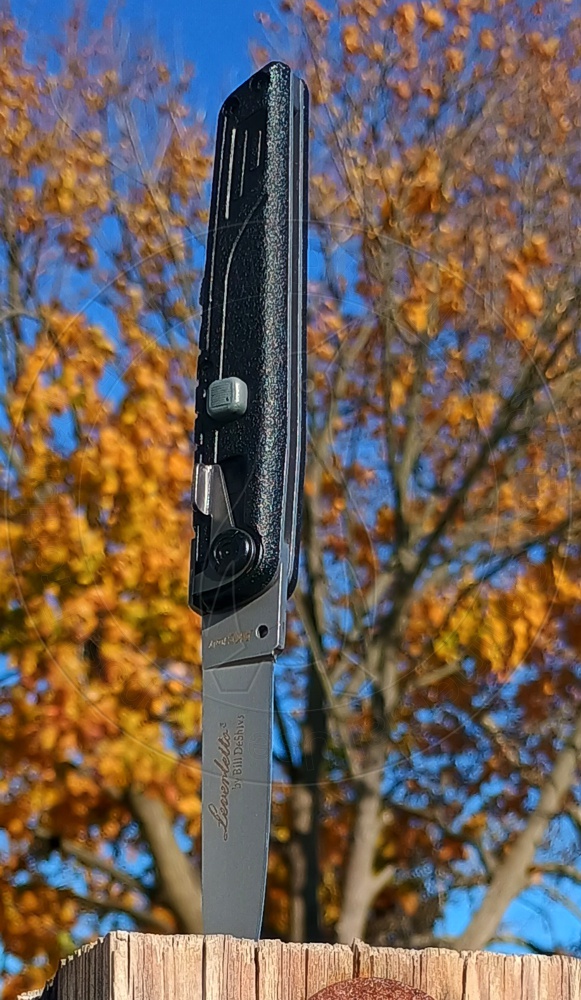
While we are on the topic of counterfeits, here's this. The oddity of this knife is a double-whammy because it is not only mechanically interesting, but it positions itself explicitly as a knockoff.
And there's a twist there, because I'm almost completely certain that this knife is an AI hallucination. Or the real world equivalent, anyway; a physical artifact you can hold in your hands that's a clone of an original that doesn't exist.
Let me back up and start at the beginning.
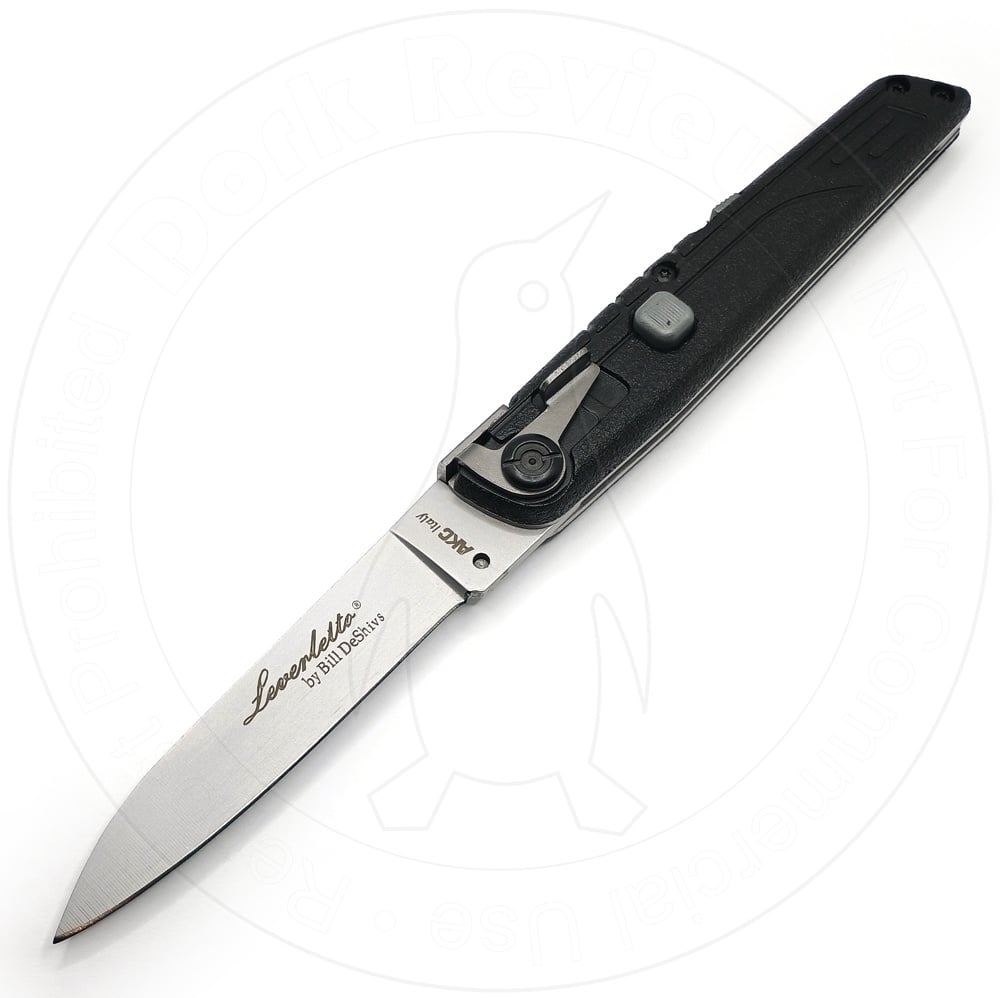
This is the "AKC Coltsock II," which is of course endlessly resold under a variety of guises, often including the words "Mafia" or "Stilletto" in the description somewhere. And the distinct "Leverletto by Bill DeShivs" inscription on the blade is pretty hard to miss.
Bill DeShivs is a very real knife designer who is the originator of the Leverletto design and trademark. This has of course been knocked off wholesale and many times over by various Chinese counterfeiters, a point about which Bill himself has become a bit acerbic, and deservedly so. His genuine knives are quite collectible and command a high price, which certainly hasn't gone unnoticed by those wacky Chinamen who are happy to horn in on that particular market with oodles and oodles of cheap fake knives.
Here's the thing.
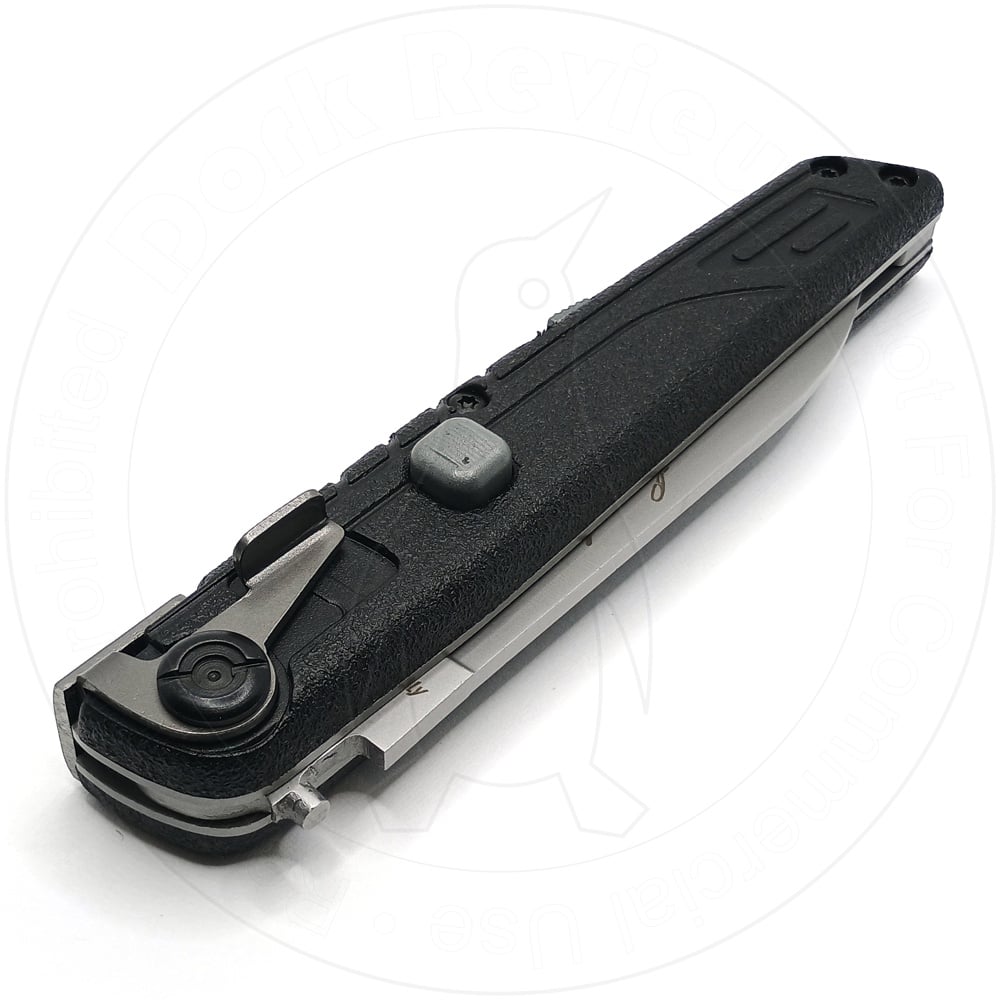
This "Coltsock" knife has a fake DeShivs trademark on it, and even bills itself as a "Leverletto" (even though the mechanism is actually different from a genuine Leverletto) but near as I can figure it doesn't resemble any original DeShivs design at all. And despite also saying "AKC" on it, nor does it look like anything I can find that AKC -- who is also a real knife manufacturer, and for whom DeShivs has legitimately designed knives -- has ever sold.
Maybe my internet sleuthing skills fail me, and maybe I'm wrong. But to the nearest decimal place I can't find any reference to this thing that isn't clearly yet another knockoff. And it is cheerfully described as such, but a knockoff of what? I can't even find any evidence of any other knife design that's been copied and had DeShivs name simply transferred to it. The best I can do is that apparently one was sold in this auction, featuring no details other than a picture of a knife that looks damn similar to mine, up to and including the slightly sketchy markings, and raises the hilarious possibility that some poor bastard got monumentally ripped off.
So there, the trail goes cold. There's not even anything that even looks remotely like this in Bill's quite extensive online museum, nor his catalog of previous designs.
But if this is a bespoke design, why attach someone else's name to it? This whole thing makes no sense.

What drew me to this knife in the first place was of course it's wacky double-mechanism design. This is a side opening automatic, fired off by means of the large square button on the left side. But it's covered in other toggles and controls, like a toddler's busybox, and you know damn well that sort of thing is right up my alley.
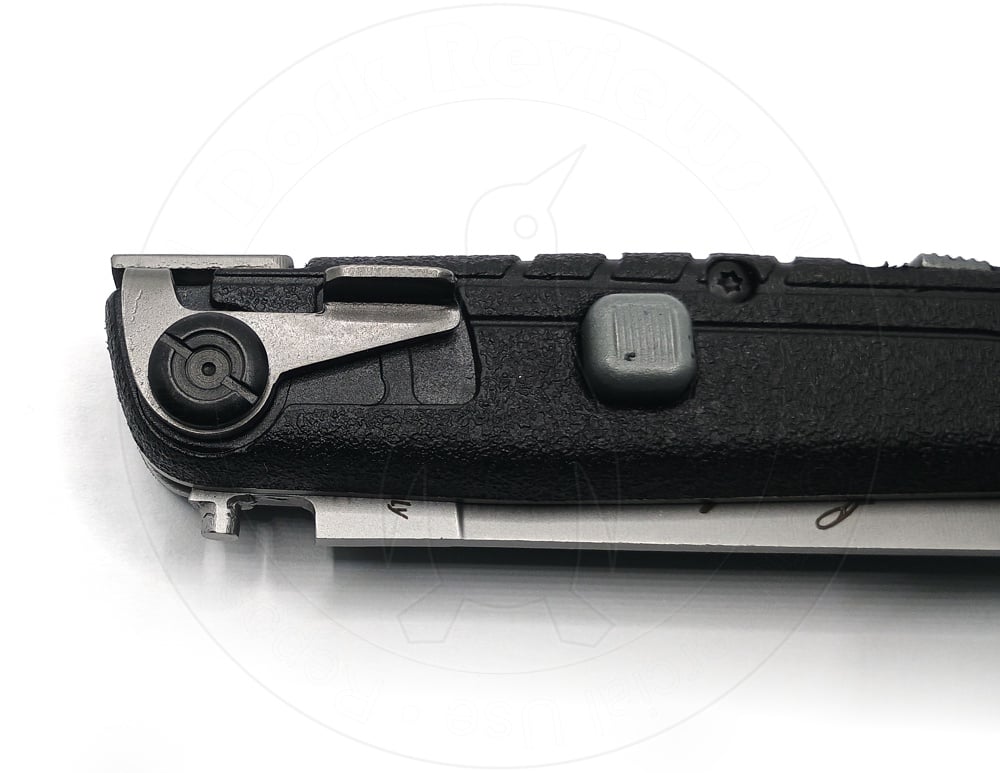
The sliding thingy on the back is a safety, what for to prevent you from setting this off in your pocket.
This is superficially a stiletto design, and has an "Italian style" lockup that works by way of a pin machined into the back of the blade falling into a hole in the flexible spring loaded bar in the spine of the handle.
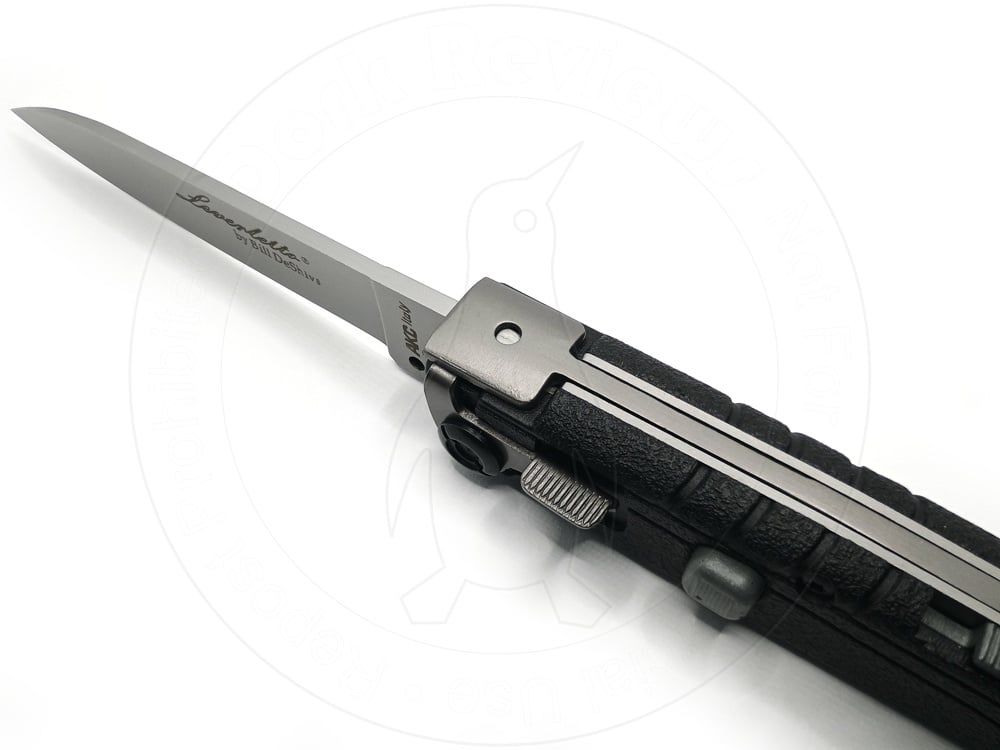
How it unlocks, though, has nothing to do with the button, unlike most side opening autos. Instead it's with this lever on the side. When you press this down it pushes the locking bar upwards just a smidge by with the help of a little folded-over prong, releasing the blade and allowing you to close it up.
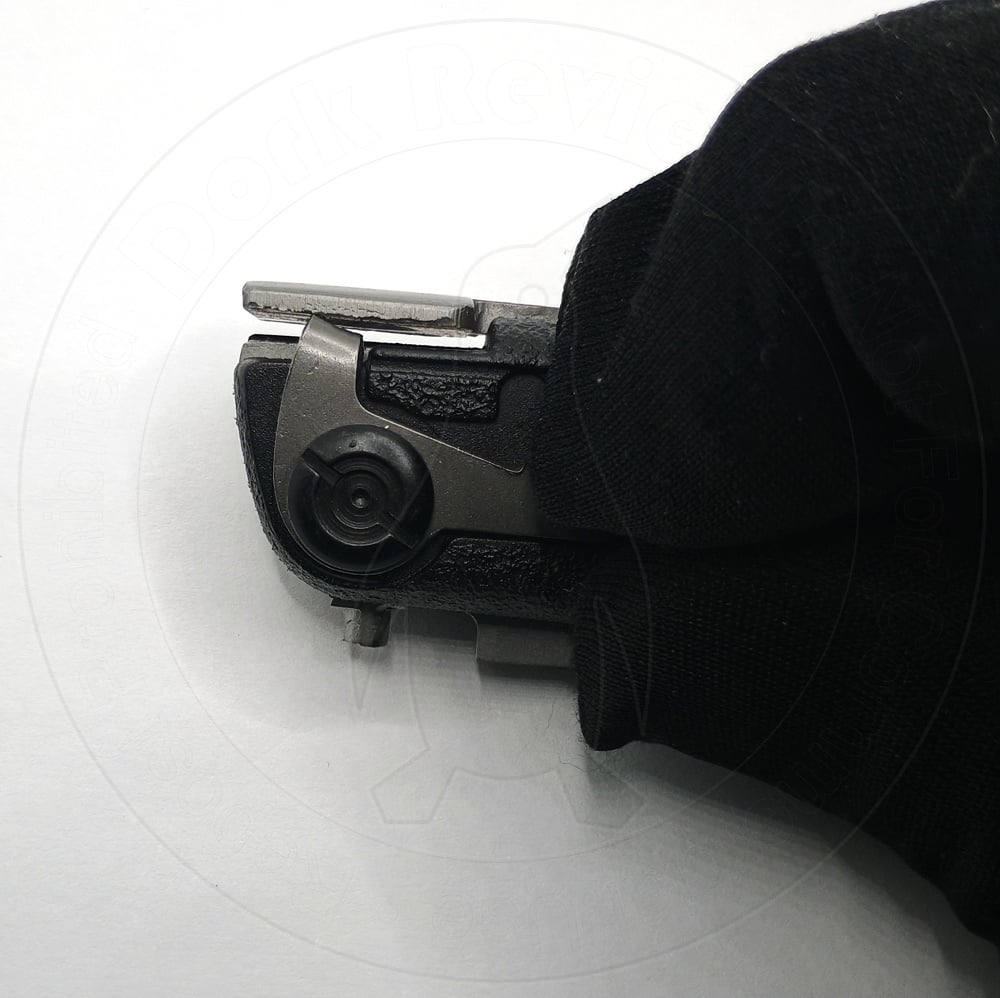
One other random thing of note is that despite snapping open with vicious alacrity...

...The spring only engages with the blade for the first little bit of its travel. Let's say 20 degrees or so. For the rest, it just flaps around freely. So again unusually compared to a lot of automatic side openers, it also allows you to half close the knife for a gratuitous glamor shot.
Like this.
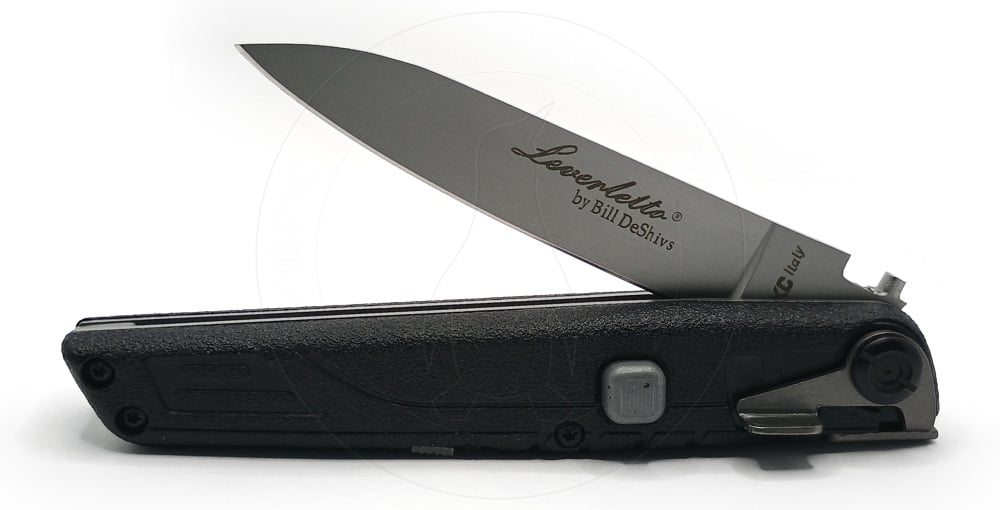
The Numbers
The Coltsock, or whatever it actually is, stands at 7-3/4" long when open and 4-3/8" when closed. It has very modern injection molded scales which various ~~sources~~ sellers sometimes describe as "FRN," i.e. glass filled Nylon, and that seems plausible. The liners, lock bar, and so forth are all steel and there are no wonder-materials to be found anywhere in it, all adding up to a net weight of 92.5 grams or 3.26 ounces.
It has a 3-1/4" long blade as measured from the forwardmost point of the handle which is incessantly described as a "stiletto" profile, although in reality it's basically just a drop point that's got a narrow footprint. It's hollow ground and not to an especially fine degree. The final product is bead blasted and satiny, but still has a visible pattern of machine marks in it. It's the usual 0.110" at it's thickest point, so you probably won't be using this for your next bushcraft knife even with the best will in the world.

All added up, the Coltsock is a pretty chunky number for its proportions and despite its wafer thin blade. A total of 0.634" across its handles, not including any of the bits of its user interface sticking out. If you include the unlocking lever, which is its widest point, it's 0.857". There is neither a clip nor a lanyard hole, so you're on your own figuring out how you want to carry it.
Oh, and as you can see the blade in my example isn't quite centered.

The steel itself is pretty straight and there isn't much lash in the pivot, but it just sits in there a hair cockeyed. And while it doesn't wiggle at the pivot noticeably, the blade is thin enough -- especially on its forwardmost half -- that it's quite easy to make it flex noticeably.
I did not take this apart because it is undoubtedly full of small fiddly springs. At least you can see from the outside that it has brass, not bronze, washers around the pivot .
Messing With It
The Coltsock is certainly a mechanical oddity. It's a damn sight easier to bust out than put away, for whatever that's worth. And I'm not super sold on the inclusion of the safety, honestly. The button takes a pretty concerted push to set off the mechanism, but on the bright side it also takes a deliberate effort to set and unset the safety, too. So it's unlikely to get accidentally activated, either way.
Fortunately, at least, the safety has no effect whatsoever on the unlocking lever. You can also fold the blade up even with the safety engaged, so it appears to work by blocking off the fire button only and not by jamming up the entire mechanism solid. So that's nice, and not a dumb as it could have been.
The Coltsock is a pretty good cutter for light duty tasks, despite itself. That's probably down to the thin hollow ground blade geometry. That's also true of lots of other small, thin hollow ground knives as well for the same reason, of course. And I'll bet you most of those won't also be illegal to carry in 99% of the world, and you might even be able to prove who actually made a lot of them.

Here's the edge. The factory grind certainly isn't spectacular. It has this weird compound angle thing going on, which is going to have to be ground out if you want to properly sharpen it. If we're feeling charitable we might theorize the manufacturer did this on purpose, rather than through ineptitude, to preserve what sharpness the edge does manage to have knowing full well the strengths and limitations of the steel they used.
But do you know, I'll bet you they didn't.
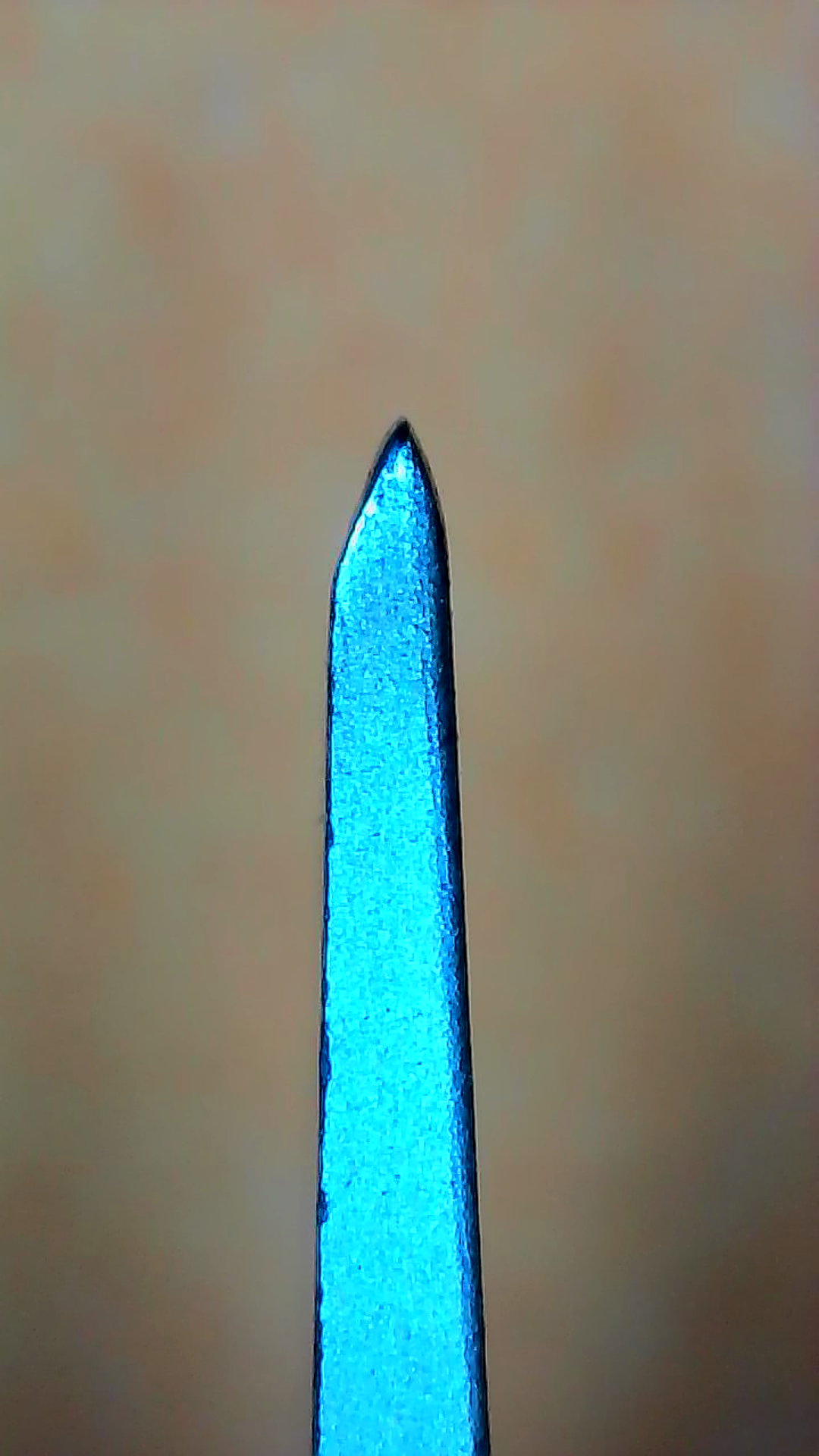
And you'll be grinding away anyway, because as expected the edge is quite out of true. It's actually not bad towards the middle of its length, but it gets progressively worse towards the tip until it culminates in what you see here.
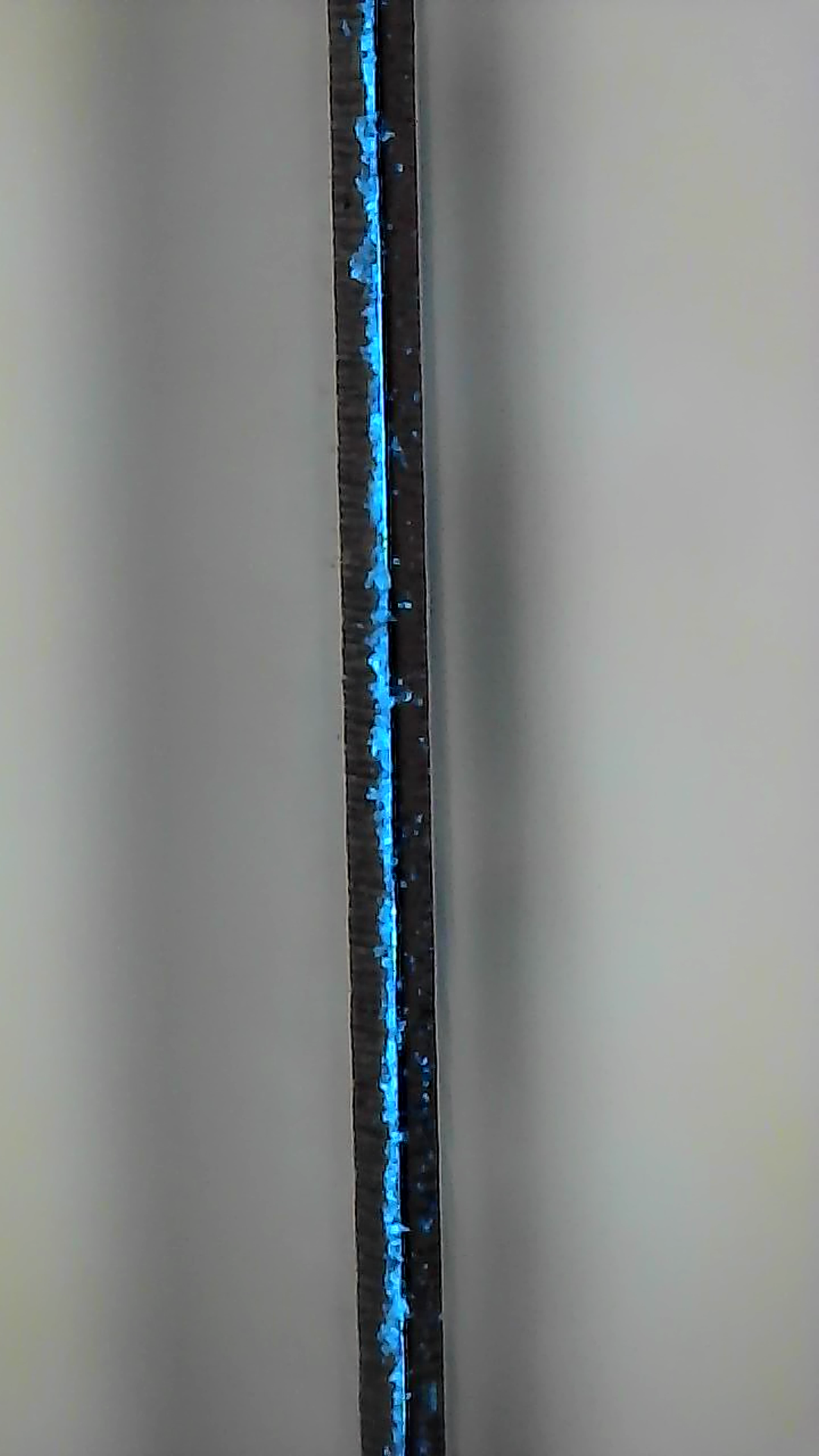
It's not as awful further up.
As a "fighting" knife, the Coltsock probably leaves a lot to be desired. All the marketing hyping up its stilettotude, plus the pseudo-tactical black injection molded scales with their high tech slots and runnels in them, are obviously trying to tell a story to the mall ninjas and whackers in the audience. As a fast opening auto with very easy to locate controls, it'd certainly be better than nothing for self defense. But it also hasn't got any kind of cross or fingerguard on it, not even the perfunctory one usually found on an Italian style stiletto, so you'd better hope your opponent is unarmed and you probably also ought not to stab him too hard lest your hand slide right up and off the handle.
On the bright side, not having a guard on it means you can almost kinda-sorta bring most of the cutting edge to bear on a flat surface. So it wouldn't be completely hopeless for cutting up your peppers and onions at camp.
Of course, your guess is as good as mine as to what the hell this is made of. There's nothing marked on it to say -- nobody's even thought to engrave a creative lie on it. It's probably 440C. That should be fine for what it is provided it's heat treated correctly. But if I were you, I wouldn't go around grinding too shallow an angle on the edge.
The Inevitable Conclusion
I'm still as baffled as you are.
If this is a knockoff, I still don't know what it's a knockoff of. And if there is no original, is it still actually a knockoff? Philosophers might argue over this until the end of our days.
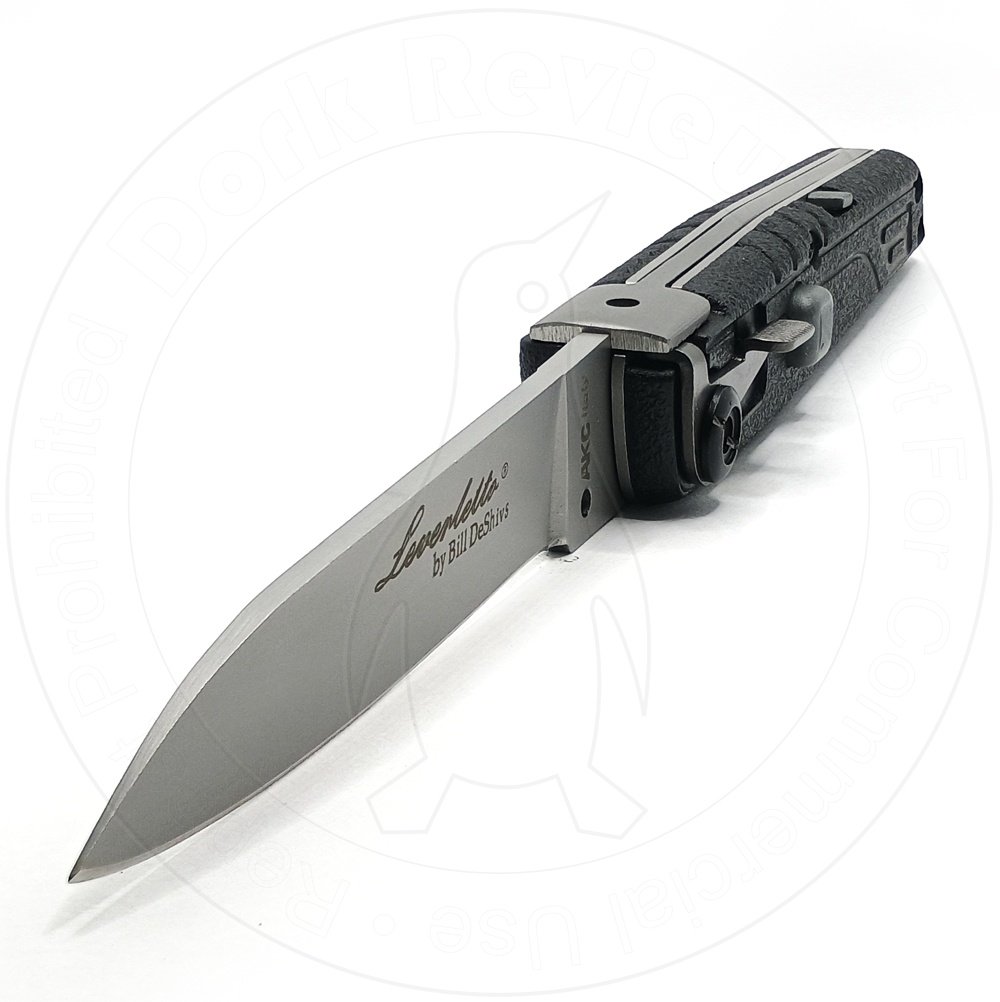

Dude every time one of your posts floats into my feed, I’m stoked. I hope you enjoy writing/making them as much as I do reading them.